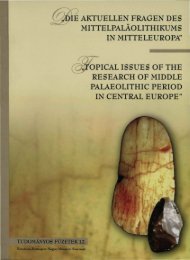- Page 1 and 2:
Basic English Syntaxwith ExercisesM
- Page 5:
Basic English Syntaxwith ExercisesM
- Page 8 and 9:
PrefaceThe target audience for the
- Page 10 and 11:
Table of ContentsChapter 3 Basic Co
- Page 12 and 13:
Table of ContentsSuggested Answers
- Page 14 and 15:
Chapter 1 - Grammatical Foundations
- Page 16 and 17:
2 Word Categories2.1 The LexiconCha
- Page 18 and 19:
Chapter 1 - Grammatical Foundations
- Page 20 and 21:
Chapter 1 - Grammatical Foundations
- Page 22 and 23:
Chapter 1 - Grammatical Foundations
- Page 24 and 25:
Chapter 1 - Grammatical Foundations
- Page 26 and 27:
Chapter 1 - Grammatical Foundations
- Page 28 and 29:
Chapter 1 - Grammatical Foundations
- Page 30 and 31:
Chapter 1 - Grammatical Foundations
- Page 32 and 33:
Chapter 1 - Grammatical Foundations
- Page 34 and 35:
Chapter 1 - Grammatical Foundations
- Page 36 and 37:
Chapter 1 - Grammatical Foundations
- Page 38 and 39:
Chapter 1 - Grammatical Foundations
- Page 40 and 41:
Chapter 1 - Grammatical Foundations
- Page 42 and 43:
Chapter 1 - Grammatical Foundations
- Page 44 and 45:
Chapter 1 - Grammatical Foundations
- Page 46 and 47:
Chapter 1 - Grammatical Foundations
- Page 48 and 49:
Chapter 1 - Grammatical Foundations
- Page 50 and 51:
Chapter 1 - Grammatical Foundations
- Page 52 and 53:
Chapter 1 - Grammatical Foundations
- Page 54 and 55:
Chapter 1 - Grammatical Foundations
- Page 56 and 57:
Chapter 1 - Grammatical Foundations
- Page 58 and 59:
Chapter 1 - Grammatical Foundations
- Page 60 and 61:
Chapter 1 - Grammatical Foundations
- Page 62 and 63:
Chapter 1 - Grammatical Foundations
- Page 64 and 65:
Chapter 1 - Grammatical Foundations
- Page 66 and 67:
Chapter 1 - Grammatical Foundations
- Page 68 and 69:
Chapter 1 - Grammatical Foundations
- Page 70 and 71:
Chapter 2 - Grammatical Foundations
- Page 72 and 73:
Chapter 2 - Grammatical Foundations
- Page 74 and 75:
Chapter 2 - Grammatical Foundations
- Page 76 and 77:
Chapter 2 - Grammatical Foundations
- Page 78 and 79:
Chapter 2 - Grammatical Foundations
- Page 80 and 81: Chapter 2 - Grammatical Foundations
- Page 82 and 83: Chapter 2 - Grammatical Foundations
- Page 84 and 85: Chapter 2 - Grammatical Foundations
- Page 86 and 87: Chapter 2 - Grammatical Foundations
- Page 88 and 89: Chapter 2 - Grammatical Foundations
- Page 90 and 91: Chapter 2 - Grammatical Foundations
- Page 92 and 93: Chapter 2 - Grammatical Foundations
- Page 94 and 95: Chapter 2 - Grammatical Foundations
- Page 96 and 97: Chapter 2 - Grammatical Foundations
- Page 99 and 100: Chapter 3Basic Concepts of Syntacti
- Page 101 and 102: X-bar TheoryNote that the X'and the
- Page 103 and 104: X-bar Theoryunderstood in this sent
- Page 105 and 106: X-bar Theory(19) XPYPX'VYPfallThese
- Page 107 and 108: X-bar Theory1.4 SpecifiersSo far we
- Page 109 and 110: X-bar Theorynoun, we conclude that
- Page 111 and 112: X-bar Theory(40) NPNPRelSNP RelS wh
- Page 113 and 114: Theoretical Aspects of MovementThe
- Page 115 and 116: Theoretical Aspects of MovementFina
- Page 117 and 118: Theoretical Aspects of Movement(61)
- Page 119 and 120: Theoretical Aspects of Movementassi
- Page 121 and 122: Theoretical Aspects of MovementThe
- Page 123 and 124: Theoretical Aspects of Movementmorp
- Page 125 and 126: Theoretical Aspects of Movementposs
- Page 127 and 128: Theoretical Aspects of MovementAs t
- Page 129: Theoretical Aspects of MovementTher
- Page 133 and 134: Test your knowledge6 Explain the di
- Page 135 and 136: Test your knowledge Exercise 3Decid
- Page 137 and 138: Test your knowledge Exercise 9Ident
- Page 139: Test your knowledge Exercise 17Why
- Page 142 and 143: Chapter 4 - The Determiner PhraseTh
- Page 144 and 145: Chapter 4 - The Determiner Phrase(1
- Page 146 and 147: Chapter 4 - The Determiner Phrase(1
- Page 148 and 149: Chapter 4 - The Determiner PhraseOf
- Page 150 and 151: Chapter 4 - The Determiner Phrase(3
- Page 152 and 153: Chapter 4 - The Determiner PhraseTh
- Page 154 and 155: Chapter 4 - The Determiner Phrasepr
- Page 156 and 157: Chapter 4 - The Determiner Phrase(6
- Page 158 and 159: Chapter 4 - The Determiner PhraseOf
- Page 160 and 161: Chapter 4 - The Determiner Phrase(7
- Page 162 and 163: Chapter 4 - The Determiner Phrase(3
- Page 165 and 166: Chapter 5Verb PhrasesIn this chapte
- Page 167 and 168: Event Structure and Aspectsome othe
- Page 169 and 170: Verb Types(10) a there arrived a le
- Page 171 and 172: Verb TypesThe position to which the
- Page 173 and 174: Verb TypesThe thematic relationship
- Page 175 and 176: Verb Types(39) a I broke the window
- Page 177 and 178: Verb Types(48) a Mike made the ball
- Page 179 and 180: Verb Types(54) a elmozdította a do
- Page 181 and 182:
Verb Typesconstruction in their ‘
- Page 183 and 184:
Verb Typesassumption of a position
- Page 185 and 186:
Verb Types(73) vPDPv'Pete v VPe DP
- Page 187 and 188:
Verb Types(78) vPDPv'Pete v VPagent
- Page 189 and 190:
Verb Typesand that these are passed
- Page 191 and 192:
Verb Types(90) e = e 1 : e 1 = ‘F
- Page 193 and 194:
Verb TypesbvPDPv'Ursula v vPv 2 e D
- Page 195 and 196:
Verb Types(102) vPDPv'Sam v VPsmile
- Page 197 and 198:
Verb Types(111) a Porter put the bo
- Page 199 and 200:
Verb Typeswhich the main verb moves
- Page 201 and 202:
Verb Types(125) a he lived right ne
- Page 203 and 204:
Verb TypesIn this structure, presum
- Page 205 and 206:
Verb Typesvery difficult problems f
- Page 207 and 208:
Verb TypesIn this, the verb moves f
- Page 209 and 210:
Aspectual Auxiliary Verbs2.9 Summar
- Page 211 and 212:
Aspectual Auxiliary Verbs(158) a di
- Page 213 and 214:
Aspectual Auxiliary Verbsevent (the
- Page 215 and 216:
Adverbs, PPs and Clausal modifiers4
- Page 217 and 218:
Adverbs, PPs and Clausal modifiers(
- Page 219 and 220:
Adverbs, PPs and Clausal modifiersW
- Page 221 and 222:
Conclusion(186) a vPDPv'Harry v' Sv
- Page 223 and 224:
Test your knowledge Exercise 2Deter
- Page 225 and 226:
Chapter 6Inflectional PhrasesIn the
- Page 227 and 228:
The structure of IPIn the previous
- Page 229 and 230:
The structure of IPInflections also
- Page 231 and 232:
The syntax of inflection(17) repres
- Page 233 and 234:
The syntax of inflection(20) IP- I'
- Page 235 and 236:
The syntax of inflection(27) IP- I'
- Page 237 and 238:
The syntax of inflectionBesides the
- Page 239 and 240:
The syntax of inflectionverb cannot
- Page 241 and 242:
The syntax of inflection(44) a I th
- Page 243 and 244:
The syntax of inflection(53) a I qu
- Page 245 and 246:
3 Movement to Spec IPMovement to Sp
- Page 247 and 248:
Movement to Spec IP(60) vPDPv'they
- Page 249 and 250:
Movement to Spec IP(66) an element
- Page 251 and 252:
Conclusion(71) IPDPI'API'IvPvv'vPNo
- Page 253:
Test your knowledge Exercise 4Give
- Page 256 and 257:
Chapter 7 - Complementiser PhrasesI
- Page 258 and 259:
2 The Clause as CPChapter 7 - Compl
- Page 260 and 261:
3 Interrogative CPs3.1 Basic positi
- Page 262 and 263:
Chapter 7 - Complementiser Phrases3
- Page 264 and 265:
Chapter 7 - Complementiser PhrasesI
- Page 266 and 267:
Chapter 7 - Complementiser PhrasesT
- Page 268 and 269:
Chapter 7 - Complementiser Phrasese
- Page 270 and 271:
Chapter 7 - Complementiser PhrasesI
- Page 272 and 273:
Chapter 7 - Complementiser Phrases(
- Page 274 and 275:
Chapter 7 - Complementiser Phrases(
- Page 276 and 277:
Chapter 7 - Complementiser Phrases(
- Page 278 and 279:
Chapter 7 - Complementiser Phrasesa
- Page 280 and 281:
Chapter 7 - Complementiser Phrasesa
- Page 282 and 283:
Chapter 7 - Complementiser Phrases5
- Page 284 and 285:
Chapter 7 - Complementiser Phrases(
- Page 286 and 287:
Chapter 7 - Complementiser PhrasesT
- Page 288 and 289:
Chapter 7 - Complementiser Phrases(
- Page 290 and 291:
Chapter 7 - Complementiser Phrases1
- Page 292 and 293:
Chapter 7 - Complementiser Phrases
- Page 294 and 295:
Chapter 8 - The Syntax of Non-Finit
- Page 296 and 297:
Chapter 8 - The Syntax of Non-Finit
- Page 298 and 299:
Chapter 8 - The Syntax of Non-Finit
- Page 300 and 301:
Chapter 8 - The Syntax of Non-Finit
- Page 302 and 303:
Chapter 8 - The Syntax of Non-Finit
- Page 304 and 305:
Chapter 8 - The Syntax of Non-Finit
- Page 306 and 307:
Chapter 8 - The Syntax of Non-Finit
- Page 308 and 309:
Chapter 8 - The Syntax of Non-Finit
- Page 310 and 311:
Chapter 8 - The Syntax of Non-Finit
- Page 312 and 313:
Chapter 8 - The Syntax of Non-Finit
- Page 314 and 315:
Chapter 8 - The Syntax of Non-Finit
- Page 316 and 317:
Chapter 8 - The Syntax of Non-Finit
- Page 318 and 319:
Chapter 8 - The Syntax of Non-Finit
- Page 320 and 321:
Check questionsChapter 8 - The Synt
- Page 322 and 323:
Chapter 8 - The Syntax of Non-Finit
- Page 325 and 326:
Suggested Answers and HintsChapter
- Page 327 and 328:
Exercise 2 Exercise 2A given verb m
- Page 329 and 330:
Exercise 4 Exercise 4 Exercise 5a J
- Page 331 and 332:
Exercise 7un+happi+estThis word con
- Page 333 and 334:
Exercise 10(9) a In the present sit
- Page 335 and 336:
Exercise 11Degree adverbsa cverydmo
- Page 337 and 338:
Exercise 13f Jane broke the vase.Th
- Page 339 and 340:
Check QuestionsChapter 2 Check Ques
- Page 341 and 342:
Check questionsChapter 3 Check ques
- Page 343 and 344:
Exercise 1 Exercise 1Possible confi
- Page 345 and 346:
Exercise 9will category: [+F, -N, +
- Page 347 and 348:
Exercise 11(2) VPVPYPV' adjunctV 0X
- Page 349 and 350:
Exercise 13(iii) In sentence (3a) b
- Page 351 and 352:
Exercise 14The adjunct PP is merged
- Page 353 and 354:
Exercise 15d) DPD'DaNPN'APN'tall AP
- Page 355 and 356:
Exercise 16g) NNNNorangeN cocktailj
- Page 357 and 358:
Exercise 18b) Predicate: thinkThema
- Page 359 and 360:
Check Questionsindefinite. Again, t
- Page 361 and 362:
Suggested answer forExercise 1(1) b
- Page 363 and 364:
Suggested answer forExercise 1(1) d
- Page 365 and 366:
Suggested answer forExercise 1(1) f
- Page 367 and 368:
Exercise 4 Exercise 4(1) DPDPD'the
- Page 369 and 370:
Exercise 4(3) DPD'DtheNPN'APN'most
- Page 371 and 372:
Exercise 5 Exercise 5In the Italian
- Page 373 and 374:
Exercise 8DPD'DNPanN'NPPanalysisP'P
- Page 375 and 376:
Exercise 9bDPD'D 0NPe AP N'one N 0
- Page 377 and 378:
Check Questionscontribute to the me
- Page 379 and 380:
Exercise 2Multiple complement verbs
- Page 381 and 382:
Exercise 2f Kevin killed Karen.agen
- Page 383 and 384:
Exercise 2k The window opened.theme
- Page 385 and 386:
Exercise 3 Exercise 3Verb Tense Asp
- Page 387 and 388:
Exercise 6(1) h Reorganisation of a
- Page 389 and 390:
Check Questionsoccur in embedded co
- Page 391 and 392:
Exercise 2I. Bill gets accusative C
- Page 393 and 394:
Exercise 4 Exercise 4a) In the sent
- Page 395 and 396:
Exercise 4c) The sentence David rol
- Page 397 and 398:
Exercise 4e) The verb sink is an er
- Page 399 and 400:
Exercise 4g) In the sentence Bill c
- Page 401 and 402:
Exercise 4i) The verb cough in the
- Page 403 and 404:
Exercise 4In our sentence, this pos
- Page 405 and 406:
Exercise 4m) In the sentence Jim to
- Page 407 and 408:
Exercise 4CP 3C'CIPthat DP I'Jim I
- Page 409 and 410:
Check QuesionsQ2 Main clauses in En
- Page 411 and 412:
Check Quesionsstructurally from the
- Page 413 and 414:
Exercise 3 Exercise 3e Has John eve
- Page 415 and 416:
Exercise 4(1) b raisingThe verb see
- Page 417 and 418:
Exercise 5 Exercise 5(1) a Which bo
- Page 419 and 420:
Exercise 6It is assumed that the su
- Page 421 and 422:
Exercise 7(6) a John -s like whob W
- Page 423 and 424:
Exercise 8As the grammaticality in
- Page 425 and 426:
Check QuestionsChapter 8 Check Ques
- Page 427 and 428:
Exercise 1 Exercise 1a- adjective,
- Page 429 and 430:
Exercise 4possible antecedent in th
- Page 431 and 432:
Exercise 6(v) In sentence (1e) ther
- Page 433 and 434:
Exercise 9 Exercise 9f [PRO] To err
- Page 435 and 436:
Exercise 9IPt 2I'IvPv'vvPtov'vvPhav
- Page 437 and 438:
Exercise 9IPt 4I'IvPv'vvPtov'vvPbe
- Page 439 and 440:
Exercise 9In sentence (1d) the main
- Page 441:
Exercise 9CP 7C'CIPPRO 8I'IvPv'vvPt
- Page 444 and 445:
Glossaryadjunction: a type of movem
- Page 446 and 447:
Glossarybase-generate: to insert co
- Page 448 and 449:
Glossarywhere for is used not as a
- Page 450 and 451:
Glossaryby a wh-element. The meanin
- Page 452 and 453:
Glossaryfinite verb form: a verb fo
- Page 454 and 455:
Glossarypresent approach, however,
- Page 456 and 457:
Glossarymorphological case: there i
- Page 458 and 459:
GlossaryGeneralisation), so the DP
- Page 460 and 461:
Glossarypronominal: those DPs that
- Page 462 and 463:
Glossaryspecifier rule: one of the
- Page 464 and 465:
Glossarytrace: moved constituents l
- Page 466 and 467:
Glossarywh-relative: a relative cla
- Page 468 and 469:
IndexA.adjacency 221adjective 11, 1
- Page 470 and 471:
IndexD.dative alternate see dative
- Page 472 and 473:
Indexmorphology 31, 33, 43, 75, 76,
- Page 474 and 475:
Indexmissing subject 100, 190, 225,


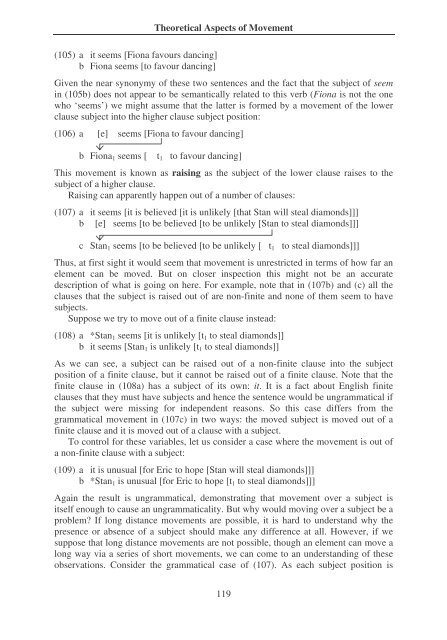
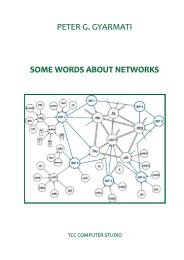
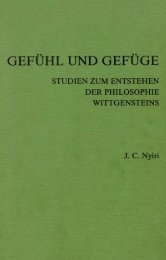
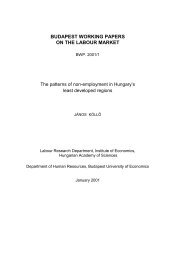

![Letöltés egy fájlban [4.3 MB - PDF]](https://img.yumpu.com/50159926/1/180x260/letaltacs-egy-fajlban-43-mb-pdf.jpg?quality=85)





